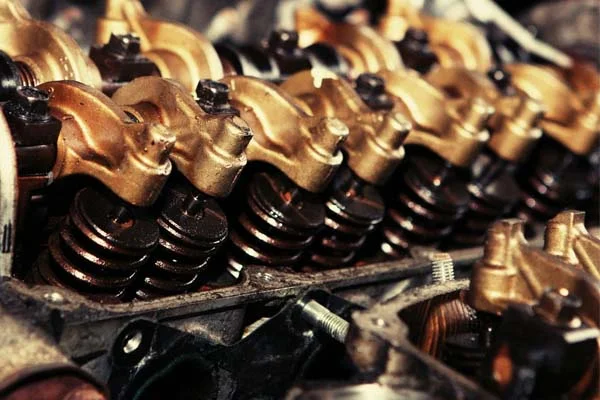Why Is My Engine Making A Ticking Noise?
Your engine makes noise while it operates. With so many moving components working together to produce the power needed to move your car, engine noise is inevitable. That being said, you may be driving one day and hear a new sound, one you haven’t heard before. An audible tick from the engine bay can be concerning to hear. There are several potential causes for it, ranging from minor to catastrophic. Read on to learn more about the causes of engine ticking.
Low Oil or Oil Pressure
The oil keeps all the moving components in your engine lubricated, preventing catastrophic damage from friction and heat. An engine with low oil or low oil pressure can make a ticking noise due to a lack of lubrication. If you are low on oil, it may indicate either oil consumption or an oil leak, both of which should be addressed as soon as possible. If you have low oil pressure, you will likely get a warning on the dash, specifically an illuminated symbol resembling a genie lamp. Low pressure can be caused by a faulty oil pump or incorrect oil viscosity and is a very serious condition that can destroy your engine if not addressed.
Valve train noise
Your engine’s valve train is located in the cylinder head. The valve train is responsible for opening and closing the intake and exhaust valves, allowing air and fuel into the cylinders, and exhaust gases out. Valve trains contain many small moving parts that can start to make noise when something isn’t right.

Valves out of adjustment
Depending on the make and model of your vehicle, valves that are out of adjustment can cause a ticking noise. This is especially applicable to older, higher-mileage vehicles. Some modern automakers like Honda still require a valve adjustment on higher mileage motors. Getting the valves correctly adjusted will not only silence the ticking, but can improve engine response, power, and smoothness.
Loud lifters
Lifters control the “lash” between the rocker arm and the top of the valve. Older motors utilize solid lifters, which need to be manually adjusted to accommodate the expansion and contraction of metal during temperature changes. Solid lifters can get out of adjustment and tend to be much louder, particularly on startup
Most modern vehicles use hydraulic lifters, which utilize oil pressure to adjust the lash. Hydraulic lifters keep the lash at 0 regardless of the engine temperature. This results in much quieter engine operation when they are functioning correctly.
A blocked oil passage or low oil pressure can cause lifters to produce a tap or tick due to a lack of lubrication.
Exhaust Manifold or Header Leak
If the gasket between the exhaust manifold and cylinder head has gone bad, it can produce a ticking noise that will increase in rate as your engine RPMs climb. If you have an engine with a “V” layout (V6 or V8 being the most common) the ticking will usually be louder on one side unless both cylinder banks leak.
Exhaust leaks can also produce sounds other than ticking, such as hissing, rumbling, or popping. If experiencing an exhaust leak, you should have it taken care of promptly as it’s allowing unfiltered exhaust fumes into the surrounding air. Not only will this prevent you from passing emissions testing, but it’s also not healthy to be inhaling these fumes.
Rod Knock
Connecting rod knock is a serious condition that requires in-depth and extensive engine repair. The rods connect the pistons to the crankshaft, allowing the energy from combustion to be transferred through the engine, transmission, and to the wheels. The connection between the rods and crankshaft uses a softer metal bearing that keeps the piston movements controlled and smooth. They leave a very small clearance allowing oil to lubricate the contact point between the crank and the bearing.
Over time, the bearings wear out and, in some instances, fail. When a bearing fails, there is significant space between the rod and the crankshaft. As the piston and rod travel up and down, the excess movement of the rod produces a banging noise you can hear from the driver’s seat.

Many conditions can produce sounds that emulate rod knock. True rod knock will almost always be accompanied by low oil pressure, be the most audible when you are decelerating, and won’t go away. Continuing to drive with rod knock can destroy the internals of your engine entirely.
Engine Fan
If something is in the way of the engine fan, it can produce a ticking noise. A noise caused by the engine fan will remain steady and won’t follow the RPMs of the engine, meaning you may hear this while stopped at a stoplight or parked with the vehicle running.
Faulty Bearing
Bearings are intended to help things turn smoothly, but when they wear down over time it can cause them to produce a ticking noise. Various engine accessories and belt-driven components use bearings to ensure smooth rotation, such as the alternator, water pump, and A/C compressor.
Normal ticking noises
Not all ticking noises are bad. The majority of motors will have some degree of methodical ticking when they are running. The fuel injectors, purge valve, and PCV valve can all produce a ticking noise, but it will generally be quieter.
Engine ticking? Come see us!
At Becker Service Center, our technicians have the skills and experience needed to diagnose the ticking noise your car is making. Give us a call or schedule an appointment at our Naperville repair shop today!